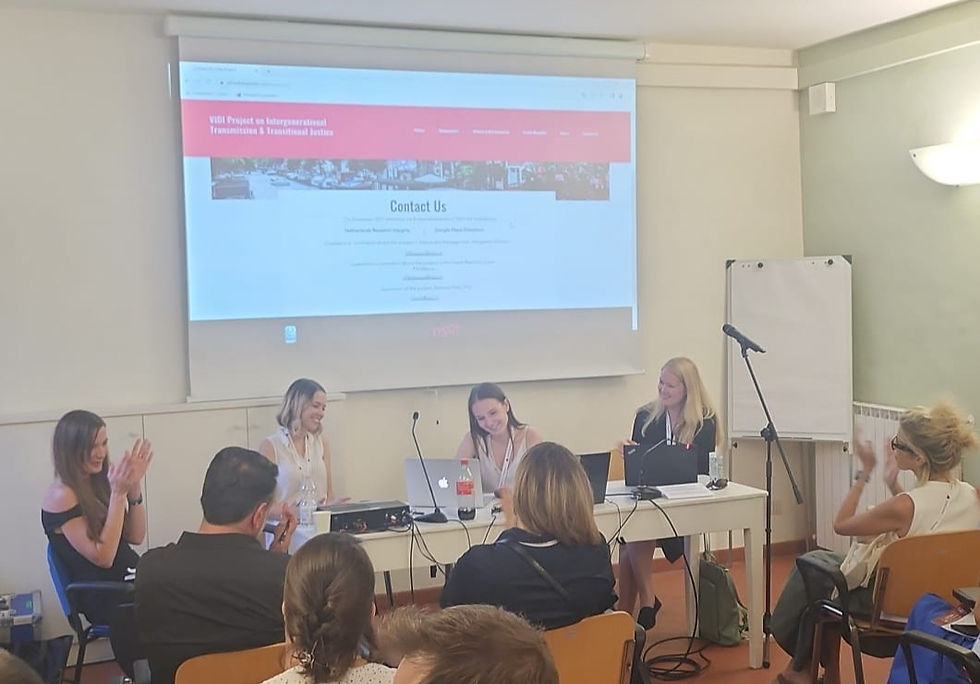This September, our team visited the beautiful Florence to present our project at EuroCrim23, the 23rd Annual Conference of the European Society for Criminology. As a part of the panel called “From the Past Back to the Future: Transitional Justice and Intergenerational Legacies of Mass Atrocities”, Lucie and Margareta presented their case studies on the Czech Republic and Bosnia and Herzegovina, respectively. Mirza was also a part of our panel and presented his PhD research on the homotypic intergenerational continuities of atrocity crimes in Bosnia and Herzegovina. You can read through the summaries of our presentations below!
Upon finishing their presentations, members of the audience used their opportunity to inquire about our next steps in research. We were very happy to have had quite a big international audience very much interested and intrigued by our research and we cannot wait for the next opportunity to share all the interesting insights we gain throughout our fieldwork. Lucie has already started collecting quantitative data by surveying three generations of Czech citizens on their experience, psychosocial well-being, and... Well, we cannot reveal everything all at once... So, make sure to stay tuned and keep an eye on our website – we will soon be publishing very interesting sneak peeks and updates!

Summaries of our presentations
Mirza Buljubašić, PhD
Inside the Cycle of Violence: the Homotypic Intergenerational Continuities of Atrocity Crimes as Radicalisation and Extremism
Violent extremism is part and parcel of wars and atrocity crimes. It impacts post-conflict societies and can have effects on future generations. This presentation argues that the intergenerational process of radicalization to violent extremism represents a homotypical continuity of atrocity crimes by 'other means' during periods of absence of violence. Previous empirical research has used the cycle of violence framework to explore the extent and mechanisms of intergenerational continuities of atrocity crimes at family and communal levels. While there is evidence for the homotypic intergenerational continuities of atrocity crimes across different contexts, the research on whether and how 'violence begets violence' has focused mainly on proneness to personal harm, such as criminal and antisocial behaviour (e.g. domestic violence, child abuse), rather than intergenerational radicalization that can lead to the development of extremist beliefs and/or behaviours. By intersecting knowledge from atrocity, and terrorism/extremism studies, this presentation aims to explore the overlooked homotypical intergenerational continuities of atrocity crimes. Scholars have argued that the history of wars and atrocity crimes is one of the significant predictors of relapse into mass violence, and in Bosnia and Herzegovina, historical trauma inflicted by past atrocities is still omnipresent. To provide empirical evidence to the argument, this research draws on family-level interviews and communal-level focus groups in the broader socio-ecological framework in war-affected and ethnically 'divided' cities: (East and West) Mostar, Sarajevo, and East Sarajevo. It argues that the homotypical intergenerational continuities of atrocity crimes are the radicalization of ingroup members in families and communities.
Lucie Pěntáková, PhD Candidate
Rubbing Salt into the Wound: the Modulatory Role of Retributive Transitional Justice in Intergenerational Transmission of Psychosocial Legacies of Political Repression
Previous research has demonstrated that extreme forms of violence and human rights violations can have long-lasting psychosocial consequences, which may extend well beyond the traumatized individuals to affect succeeding post-conflict generations in terms of their well-being, worldviews, as well as social and interpersonal functioning. In an effort to avert these intergenerational effects, contemporary scholarship has sought to understand the transmission process of these psychosocial legacies but has so far neglected to account for the possible modulatory role of transitional justice measures. This study seeks to fill this gap by examining the role of transitional justice in the intergenerational transmission of psychosocial legacies in the Czech Republic, which constitutes an optimal research site due to its history marked by prolonged political repression under the communist regime and the subsequent adoption of transitional justice measures in the form of extensive lustrations and public exposure of former secret police collaborators. The study will employ a mixed-methods approach, combining qualitative interviews with victims and perpetrators of political repression and their descendants with a quantitative survey to assess (i) what and how psychosocial legacies of political repression are transmitted to the post-communist generation within Czech families and (ii) what role lustration and exposure as secret police collaborator play in the process of intergenerational transmission. In this presentation, I will outline the theoretical background and stimulate a discussion on the methodological and ethical considerations of the study.
Margareta Blažević, PhD Candidate
The Battle of War Narratives in Bosnia and Herzegovina: Exploring Processes of (Re)Shaping and Intergenerational Transmission of War Narratives
Almost thirty years after the end of the war in Bosnia and Herzegovina, the country is still confronted with persistent political tensions, nationalist sentiment, and the rise of historical revisionism as well as ethnic segregation and interethnic animosity. The country’s three major ethnic groups, namely, Bosniaks, Croats, and Serbs, remain in conflict over the legacy of the past war while the findings of domestic and international courts are often denied or reinterpreted to reinforce ethnic narratives about the war and polarization. Based on a literature review, original survey, and interviews, this project aims to investigate the intergenerational (dis-)continuities of Bosnian War narratives, on an individual and family level. It will explore the ways in which individual war narratives are shaped and transmitted across generations while looking at interactions between ethnic war narratives and narratives of the International Criminal Tribunal for the Former Yugoslavia (ICTY). Additionally, I will investigate factors that can influence narrative development, internalization, and intergenerational transmission such as group identity, media consumption, and personal experiences with war. In this presentation, I will outline the project and brainstorm about theoretical, methodological, and ethical considerations of my research.
Comments